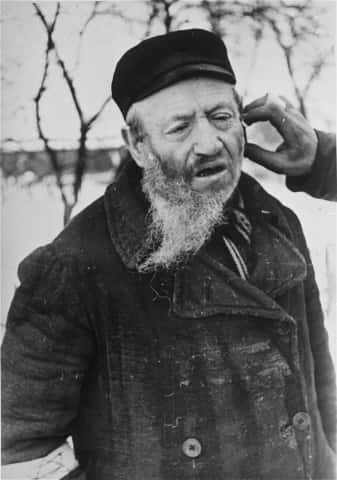Home » The first several months
In the first week of the war, Hrubieszow was bombed by the Luftwaffe (Nazi Germany’s air force), and on September 14, the Wehrmacht (the German army) entered the town. German soldiers began looting Jewish shops and raping Jewish girls the moment they stepped foot in the town. Nevertheless, the Jews entertained the hope that their plight would be alleviated following the transition to civilian rule.
A week after the German invasion of Hrubieszow , on the eve of Yom Kippur, the Germans withdrew, and on Yom Kippur, Polish soldiers roaming around the area entered the town, and looted Jewish shops, just as the Germans had done. The following evening, Red Army soldiers entered Hrubieszow and stayed in the town for about 11 days, after which they withdrew, in accordance with the Ribbentrop-Molotov agreement (link 1), signed by Nazi Germany and the USSR, according to which they pledged they wouldn’t attack each other. They were joined by several hundred young Jews – poor Jews who had no property of their own – and leftists who had collaborated with Soviet authorities. On October 4, Wehrmacht soldiers reentered the town, and immediately began looting Jewish property, and abducting Jews to use them for forced labor while abusing and humiliating them. The persecution became even worse when the Gestapo arrived in Hrubieszow, followed by the establishment of Polish and Ukrainian police units were established. The Germans placed a ransom payment of 120,000 zlotys on the Jews, and if the Jews were unable to collect this amount on time, they were charged an additional fine, amounting to 80,000 zlotys. The Gestapo accused Rabbi Yochanan Tversky of failing to complying with this order. The rabbi fled to a nearby village, but the Germans tracked him down and executed him there.
On November 15, 1939, the Germans announced that Jews wishing to move to areas of eastern Poland under Soviet control could obtain a permit for ten zlotys. Hundreds of Jews took the bait and purchased the “permits”, but when they approached the border, SS men attacked them, beat them severely, and robbed them of all their valuables.
The Ribbentrop-Molotov Pact was signed between the USSR (Soviet Union) and Nazi Germany about two weeks before the outbreak of the war. One part of the agreement was a non-aggression pact between the two countries for a period of ten years, according to which they pledged not to attack each other and not to assist others to do so. The agreement included a secret annex detailing how the two countries’ spheres of influence were be divided up in Eastern Europe, and the USSR annexed the entire eastern part of Poland. The agreement was violated by Nazi Germany on June 22, 1941 when Nazi Germany invaded Soviet territory.
Emanuel Ringelblum was a historian and public figure, known mainly for the underground archive, “Oneg Shabbat”, that he managed in the Warsaw ghetto.
A Jew whose beard is forcefully trimmed.
